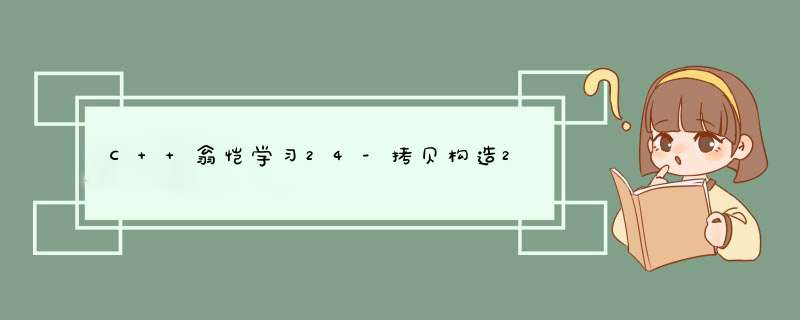
如果类包含指针?
Copy pointer:
#ifndef PERSON_H_
#define PERSON_H_
class Person
{
public:
Person(const char* s);//构造函数
~Person();//析构函数
void print();//函数原型,没有实际body,有一些什么样的函数
//...
//private:
char* name ;//数据成员 char* instead of string
//...
};
#endif // !PERSON_H_
//person.h#include "person.h"
#include
#include
using namespace std;
//在.cpp文件中定义在.h文件中声明的那些东西的实体
Person::Person(const char* s)
{
name = new char[::strlen(s)+1];
::strcpy(name,s);
}
Person::~Person()
{
//delete[] name;
}
void Person::print()
{
cout << "something" << endl;
}
//person.cpp #include
#include "person.h"
using namespace std;
int main()
{
Person p1("Jhon");
Person p2 = p1; //Person p2(p1);
printf("p1.name=%p\n", p1.name); // p1 name 的地址
printf("p2.name=%p\n", p2.name);
return 0;
}
//main.cpp
地址一样,报错原因:指向同一块内存,被析构了两次。
p1 和 p2 指向同一块内存,即 Copy pointer,而我们想要 Copy entire block。
character strings- in c++,a character string is
- an array of characters
- with a special terminator--"four" or ASCII null
- the string "c++" is represented,in memory,by an array of size_t (4,count'em) characters
C的字符串:
standard c library string functions-
declared in
const strlen( - s is a null-terminated string char *s);
- returns the length of s
- length does not include the terminator!
char *strcpy (char *dest,const char *src);
- dest should have enough memory space allocated to contain src string Copy entire block :
#ifndef PERSON_H_
#define PERSON_H_
class Person
{
public:
Person(const char* s);//构造函数
Person(const Person& w);//拷贝构造函数
~Person();//析构函数
void print();//函数原型,没有实际body,有一些什么样的函数
//...
//private:
char* name ;//数据成员 char* instead of string
//...
};
#endif // !PERSON_H_
//person.h
Person(const Person& w);//copy ctor
#include "person.h"
#include
#include
using namespace std;
//在.cpp文件中定义在.h文件中声明的那些东西的实体
Person::Person(const char* s)
{
name = new char[::strlen(s)+1];
::strcpy(name,s);
}
Person::Person(const Person& w)
{
name = new char[::strlen(w.name) + 1];
::strcpy(name, w.name);
}
Person::~Person()
{
//delete[] name;
}
void Person::print()
{
cout << "something" << endl;
}
//person.cpp #include
#include "person.h"
using namespace std;
int main()
{
Person p1("Jhon");
Person p2 = p1;//Person p2(p1);
printf("p1.name=%p\n", p1.name);
printf("p2.name=%p\n", p2.name);
return 0;
}
//main.cpp private 是针对类而不是对象。所以访问一个同类对象的private 东西是可以的。
Person(char*) implementation#inlcudePerson copy constructorussing namespace std; Person::Person(const char *s){ name = new char[::strenlen(s)+1]; ::strcpy(name,s); } Person::~Person(){ delete [] name;//array delete }
-
to Person declaration add copy constructor prototype
Person::Person char(const Person& w){ name = char[::strlen(w.name)+1]; ::strcpy(name,w.name); } -
to Person .cpp add copy ctor definition
隐藏调用 -
no value return
-
accesses "w.name" across client boundary
-
the copy ctor initializes uninitialized memory
使用类的一个对象来构造另一个该类的新的对象。
when are copy constructor called?什么时候发生拷贝构造:初始化的时候。
什么时候调用拷贝构造:
1. 调用函数时候,函数参数是一个对象本身,而不是引用或者指针的时候,
void roster(Person);//declare function
Person child("Ruby");//create object
roster(child);//call function。函数参数是一个对象本身意味着调用该函数时候,调用时候重新创建一个新的Person类的对象player,就会发生拷贝构造,因为使用某个对象初始化这个player。
-
during call by value 隐藏调用
Person baby_a("Fred"); //these use the copy ctor Person baby_b = baby_a;//not an assignment Person baby_c(baby_a);//not an assignment
-
during initialization 2.初始化时。 直接调用
Person captain(){ Person player("George"); return player; } ... Person who("") ...
习惯:接受()初始化。
-
during function return 3.函数返回一个对象时。
- compilers can "optimize out" copies when safe 把拷贝构造优化掉
- program for "dumb" compilers
- programmers need to
- be ready to look for optimizations local
Person copy_func(char *who){
Person local(who);
local.print();
return Peron(who);//copy ctor called
}
Person nocopy_func(char *who){
return - failure to invoke delete()
- every object should be destroyed once
- invoking delete() more than once once an object is constructed,it can be the target of many assignment operations
- const string&
string 类的变量不用写 拷贝构造,内部实现好了。所以C++尽量用string 放弃 char*。使用 char* 只有 直接访问内存,做的是二进制数据。给人读的字符串就应该使用 string。
-
what if the name was a string (and not a char*)
#include
class Person{ public: Person(string name); ~Person(); void print(); //...other accessor fxns private: don't rely on the default;//embedded object(composition) //...other data members }; -
in the default ctor ,the compiler recursively calls the copy ctors for all member objects(and base classes)
-
default is memberwise initialization
- in general,be explicit
- create your own copy ctor--
- prevents creation of a a default copy constructor
- generates a compiler error if try to pass-by -value
- don't need a definition 一旦写一个类就写下:
default constructor
virtual constructor
copy constructor
拷贝构造是私有的,别人就不能拷贝构造你的对象了,即别人设计一个函数,函数的参数不能是你的类的对象的本身,* 和 & 还是可以的。
不建议拷贝构造是私有的。JAVA没有拷贝构造,所有对象的传递都是通过指针。
欢迎分享,转载请注明来源:内存溢出

 微信扫一扫
微信扫一扫
 支付宝扫一扫
支付宝扫一扫
评论列表(0条)